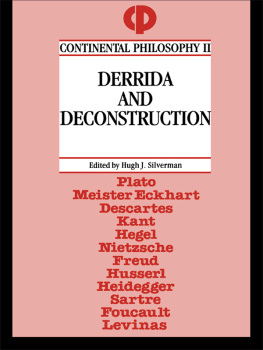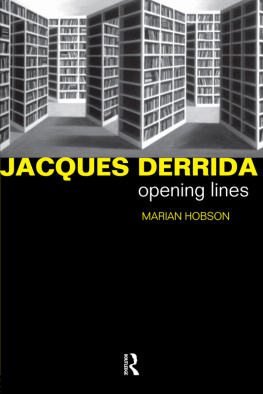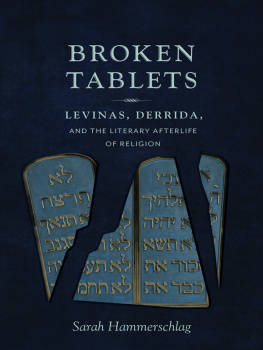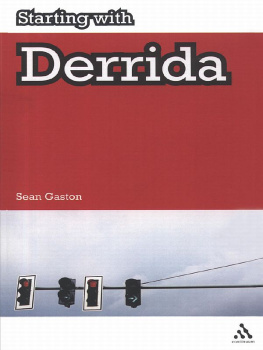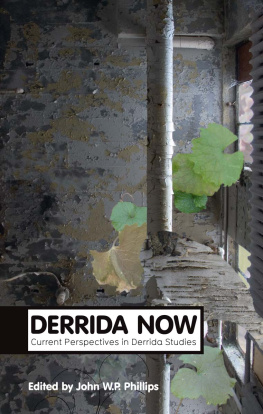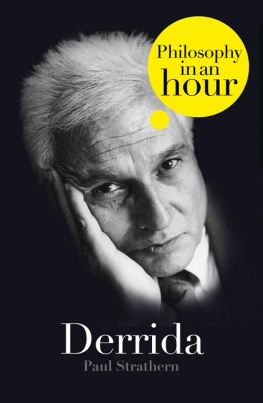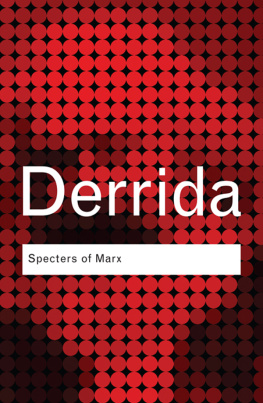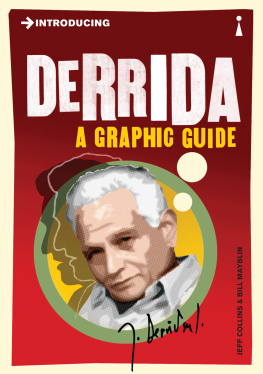Derrida Jacques - For Strasbourg: Conversations of Friendship and Philosophy
Here you can read online Derrida Jacques - For Strasbourg: Conversations of Friendship and Philosophy full text of the book (entire story) in english for free. Download pdf and epub, get meaning, cover and reviews about this ebook. City: Oxford, year: 2014, publisher: Fordham University Press;Oxford University Press, USA, genre: Religion. Description of the work, (preface) as well as reviews are available. Best literature library LitArk.com created for fans of good reading and offers a wide selection of genres:
Romance novel
Science fiction
Adventure
Detective
Science
History
Home and family
Prose
Art
Politics
Computer
Non-fiction
Religion
Business
Children
Humor
Choose a favorite category and find really read worthwhile books. Enjoy immersion in the world of imagination, feel the emotions of the characters or learn something new for yourself, make an fascinating discovery.

- Book:For Strasbourg: Conversations of Friendship and Philosophy
- Author:
- Publisher:Fordham University Press;Oxford University Press, USA
- Genre:
- Year:2014
- City:Oxford
- Rating:3 / 5
- Favourites:Add to favourites
- Your mark:
- 60
- 1
- 2
- 3
- 4
- 5
For Strasbourg: Conversations of Friendship and Philosophy: summary, description and annotation
We offer to read an annotation, description, summary or preface (depends on what the author of the book "For Strasbourg: Conversations of Friendship and Philosophy" wrote himself). If you haven't found the necessary information about the book — write in the comments, we will try to find it.
For Strasbourg: Conversations of Friendship and Philosophy — read online for free the complete book (whole text) full work
Below is the text of the book, divided by pages. System saving the place of the last page read, allows you to conveniently read the book "For Strasbourg: Conversations of Friendship and Philosophy" online for free, without having to search again every time where you left off. Put a bookmark, and you can go to the page where you finished reading at any time.
Font size:
Interval:
Bookmark:
For Strasbourg
Conversations of Friendship and Philosophy
JACQUES DERRIDA
Edited and Translated by Pascale-Anne Brault and Michael Naas

Copyright 2014 Fordham University Press
All rights reserved. No part of this publication may be reproduced, stored in a retrieval system, or transmitted in any form or by any meanselectronic, mechanical, photocopy, recording, or any otherexcept for brief quotations in printed reviews, without the prior permission of the publisher.
This book brings together four texts that were originally published in French under the following titles: Le lieu dit: Strasbourg, by Jacques Derrida, in Penser Strasbourg ditions Galile, 2004; Dialogue entre Jacques Derrida, Philippe Lacoue-Labarthe, and Jean-Luc Nancy, in Rue Descartes, no. 52 (2006): 8699, Succession Derrida/Succession Lacoue-Labarthe/Jean-Luc Nancy; Ouverture, discussion avec Jean-Luc Nancy, Rue Descartes 45 (2004): 2655, Succession Derrida/Jean-Luc Nancy; Rsponsabilit du sens a venir, conversation avec Jean-Luc Nancy, in Sens en tous sens: Autour des travaux de Jean- Luc Nancy, Editions Galilee, 2004.
Fordham University Press also publishes its books in a variety of electronic formats. Some content that appears in print may not be available in electronic books.
Library of Congress Cataloging-in-Publication Data
Derrida, Jacques.
[Essays. Selections. English]
For Strasbourg : conversations of friendship and philosophy / Jacques Derrida ; edited and translated by Pascale-Anne Brault and Michael Naas.
pages cm
Includes bibliographical references.
Summary: For Strasbourg consists of a series of essays and interviews by French philosopher and literary theorist Jacques Derrida (19302004) about the city of Strasbourg and the philosophical friendships he developed there over a forty year period. It is a profound interrogation of the relationship between philosophy and place, philosophy and language, and philosophy and friendshipProvided by publisher.
ISBN 978-0-8232-5648-8 (hardback)ISBN 978-0-8232-5649-5 (paper)
1. Derrida, JacquesFriends and associates. 2. PhilosophyFrance. 3. PhilosophersFranceInterviews. 4. Nancy, Jean-LucInterviews. 5. Lacoue-Labarthe, PhilippeInterviews. 6. Strasbourg (France)Intellectual life.
I. Title.
B2430.D482E5 2014
194dc23
2013048885
Published in the United States of America
16 15 14 5 4 3 2 1
First edition
Jacques Derrida loved the city of Strasbourg. Though he never lived or held a teaching position there, from the early 1970s right up to his death in 2004 Derrida traveled frequently to this city on the Franco-German border just over three hundred miles from Paris for everything from lectures, conferences, and colloquia to dissertation defenses, book signings, and artistic events. Attracted from the very beginning to this city because of its unique location and history, its multiplicity of languages and cultures, over time Derrida came to find Strasbourg an even more special place as organizations and movements that were dear to him came to be housed in or identified with the city, from the European Parliament to the International Parliament of Writers and the Parliament of Philosophers.
But it was above all friends who drew Derrida back to Strasbourg for more than three decades: friends in the municipality, friends in the artistic community, but especially friends in the universitybeginning with Jean-Luc Nancy and Philippe Lacoue-Labarthe. It was through these friends that Strasbourg, City of Parliaments and City of Refuge par excellence, became for Derrida a city of conversation and hospitality, indeed, of friendship and philosophy.
It was thus absolutely fitting that in June 2004, just four months before his death, the Parliament of Philosophers and the Department of Philosophy at Marc Bloch University, where Nancy and Lacoue-Labarthe were both teaching, would invite Jacques Derrida to Strasbourg for three days of meetings and conversations around his work. From June The collection For Strasbourg: Conversations of Friendship and Philosophy grew out of these events in Strasbourg, though Derrida himself never planned such a publication.
The work begins with the long tribute Derrida paid the city of Strasbourg during his three days there in June 2004. Titled The Place Name(s)Strasbourg (though it could easily bear the title or the dedication For Strasbourg), the essay recounts in great detail, and in very moving terms, Derridas affection for the city of Strasbourg, his many visits to this city, and, especially, his decades-long intellectual friendship with Nancy, Lacoue-Labarthe, and others. Through reflections, anecdotes, and shared memories with these two philosopher friends, Derrida is able to paint a fascinating portrait of French intellectual life over a thirty-year period, with stories about the many conferences he attended in Strasbourg, his testy relationship with the French university system, his break with Tel Quel, his association with Editions Galile, the founding of GREPH and of the International College of Philosophy, the importance of conferences at Cerisy-la-Salle, and so on.
This essay is a great testament to the importance of Strasbourg as a city of hospitality and of refuge for contemporary thought and, especially, for the kind of philosophy that was being done by Derrida, Nancy, and Lacoue-Labarthe and that could find a home nowhere else. Originally published in the appropriately titled volume Penser a Strasbourg (Thinking of/in Strasbourg, 2004), the essay bears witness not just to Derridas deep attachment to this border city but to his continuing interrogation of the relationship between thought and place, philosophy and language, language and nationality, philosophy and friendship. It thus raises a series of important philosophical, political, and ethical questions that might all be placed under the aegis of what Derrida came to call in his seminars of the 1980s philosophical nationalities and nationalism.
But The Place Name(s)Strasbourg is first of all a work of memory and of friendship. Punctuated by names and memories, it reads like a long good-bye to a city and its inhabitants, the last episode in Derridas
The second text included in this collection has its origin in the same three days of homage and celebration in Strasbourg, and it brings Derrida together once again with Jean-Luc Nancy and Philippe Lacoue-Labarthe. During the final day of Derridas visit, a session was organized at Marc Bloch University around the work of four doctoral students, who presented their work and discussed it with Derrida. This session was then followed by a roundtable discussion between Derrida, Nancy, and Lacoue-Labarthe that took as its point of departure these student presentations but that then went on to address questions related to the three thinkers own work, questions, for example, regarding Heidegger and his politics, community and generation, and, most poignantly, death, finitude, mourning, survival, and immortality. We thus hear Derrida, four months before his death, conversing with Strasbourgs two most famous philosophers about the all too relevant and pressing questions of legacy, the archive, the afterlife, and immortality.
First published in the journal Rue Descartes, this wide-ranging discussion between these three philosopher friends combines sharp insights into one anothers work with personal anecdotes, friendly ribbing, and good humor. It is the kind of serious but also playful discussion that is possible only among close friends. As the editors of
Next pageFont size:
Interval:
Bookmark:
Similar books «For Strasbourg: Conversations of Friendship and Philosophy»
Look at similar books to For Strasbourg: Conversations of Friendship and Philosophy. We have selected literature similar in name and meaning in the hope of providing readers with more options to find new, interesting, not yet read works.
Discussion, reviews of the book For Strasbourg: Conversations of Friendship and Philosophy and just readers' own opinions. Leave your comments, write what you think about the work, its meaning or the main characters. Specify what exactly you liked and what you didn't like, and why you think so.

